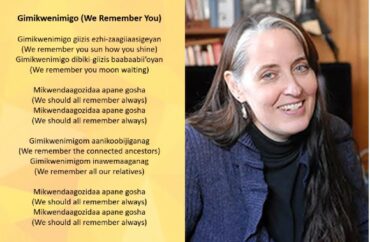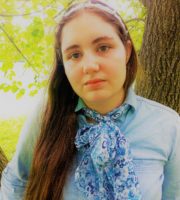
Provost says professor’s claims about her Ojibwe heritage were ‘unclear, imprecise, and confusing’
A University of Wisconsin-Milwaukee professor says she will keep her “personal beliefs” about her Native American ancestry after being accused of misrepresenting her heritage.
English Professor Margaret Noodin (pictured) told The College Fix the accusations about her lying about her Ojibwe ancestry were “false and slanderous.” She said a university investigation into the matter “closed nearly a year ago.”
“I understand that I am a public servant and can be investigated and held accountable for following all policies and guidelines,” Noodin said in a recent email.
“It is my hope that I will be allowed to maintain my personal beliefs about who I am as taught to me by members of my family and community,” the professor told The Fix.
The university investigated Noodin, who writes bilingual poetry in English and Native American languages, after accusations about misrepresenting her Ojibwe ancestry began surfacing in 2021.
Records recently uncovered by the Milwaukee Journal Sentinel show the university initially found she violated its code of conduct but later reversed the decision.
Noodin declined to answer The Fix’s questions about the specific ancestors who she says were Ojibwe, and said the investigation has not changed her personal narrative about her family history.
Noodin said she does not see any reason to “make discussions of myself” part of her role at the public university.
“I think it is important that I create neutral and safe spaces in my classes so that all students can seek an education free of any bias as they each form their own character and find their future,” she said.
Noodin suggested The Fix report about her recent project translating Ojibwe hymns instead.
‘Consistency and clarity’
In a Feb. 20 letter obtained by the Journal Sentinel, UWM Provost Andrew Daire explained why he decided to reverse the determination that Noodin had violated “UWM Code of Conduct’s expectations of integrity and trustworthiness.”
The initial investigation, conducted by Special Assistant to the Provost Stephen Schmid, found Noodin’s statements about her ancestry over the years were “confusing” and “occasionally more concrete than the information known to [her],” according to the letter.
However, Noodin asked for a review of the investigation conducted by Professor Mark Freeland, who directs the university’s Electa Quinney Institute for American Indian Education, and the provost granted the request, the letter states.
Freeland eventually concluded that Noodin did not violate the university’s code of conduct – a decision Daire accepted in his letter to Noodin.
“… I would nonetheless urge you to consider how you represent yourself publicly,” Daire wrote. “I do not disagree with Mr. Schmid’s conclusions that ‘Your statements about yourself were unclear, imprecise, and confusing…’ Consistency and clarity will be important going forward.”
Daire also addressed an “assertion in Professor Freeland’s report” that he quoted as stating, “‘I simply cannot imagine an inquiry of this type being leveled against any other ethnic, racial or political group.’”
The provost pointed Freeland and Noodin to the example of Rachel Dolezal, a former adjunct professor at Eastern Washington University, as another “allegedly false identity claim.” Dolezal said she was African American.
The reversal in Noodin’s case drew criticism from several of her former students who are members of Native American tribes.
Some pointed to her personal friendship with Freeland and his succeeding her as the director of UWM’s Electa Quinney Institute with her help, according to the Journal Sentinel.
Northwestern University Professor Doug Kiel raised some of the original questions leading to the investigation. He is a history professor and a citizen of the Oneida Nation.
Kiel told the Journal Sentinel that the reversal “reeks of cronyism and erodes university integrity.”
The Fix reached out to Daire, Freeland, and Kiel twice via email recently, asking for more information about the investigations, and the questions about Freeland’s relationship with Noodin being a conflict of interest. None replied.
Noodin says her ‘understanding’ of her race ‘has evolved’
Noodin published a positionality statement online in 2022 to address the accusations about misrepresenting her ancestry.
In it, she says her full name is Margaret Ann O’Donnell Noodin. According to the Journal Sentinel, she legally changed her last name to the Obijwe surname Noodin as an adult.
“Like many Americans, my understanding of my own race and ethnicity has evolved over time,” she wrote.
She stated that her family has Irish and French heritage, and her genealogy contains the surnames “O’Donnell, Orr, Hill, Bernard, Bean, Lagunade, Lavallee and Monplaisir.”
Noodin pointed to her ancestors Margaret Hill and Mille Lacs as possibly being of Native American ancestry, but she declined to comment when The Fix asked how these ancestors were connected to Native American tribes.
In her statement, Noodin also referenced being “raised by parents and grandparents who were teachers, storytellers, singers, and dancers.”
She wrote that she felt drawn to studying Native American languages and history as part of her understanding of her heritage.
“I am not, and have not claimed to be, an enrolled citizen of a tribal nation,” she wrote.
“Meanwhile, the online bloggers supposed that I was adopted, married too often, cutting off my family, having peers fired at work, and many other accusations that are hurtful and unfounded,” Noodin wrote. “I urge anyone with questions about my life history, language proficiency, cultural knowledge, or research to contact me directly.”
MORE: Southern Illinois U. creates position to give back museum’s Native American artifacts
IMAGE: University of Wisconsin Milwaukee/YouTube
Like The College Fix on Facebook / Follow us on Twitter






Please join the conversation about our stories on Facebook, Twitter, Instagram, Reddit, MeWe, Rumble, Gab, Minds and Gettr.